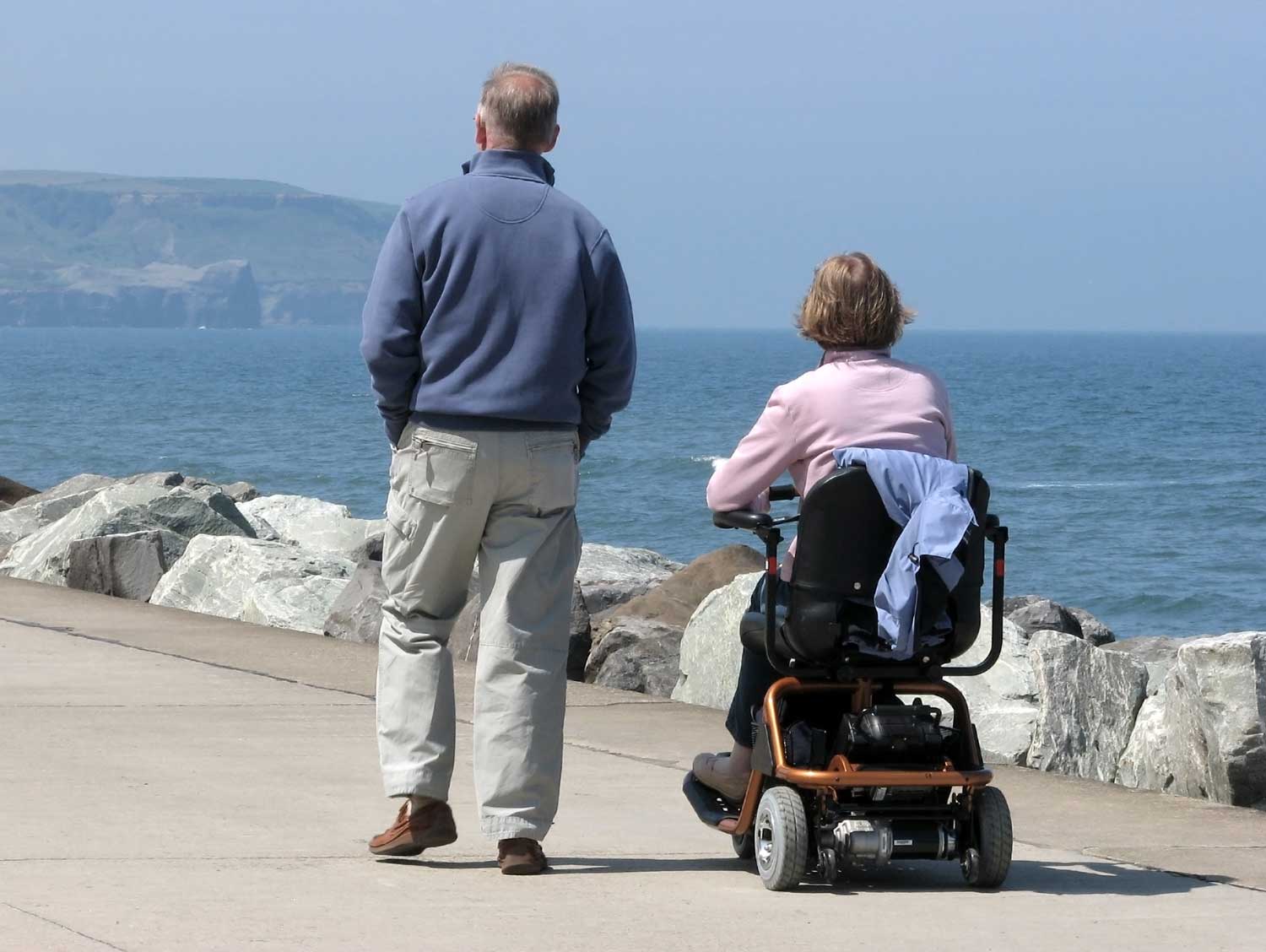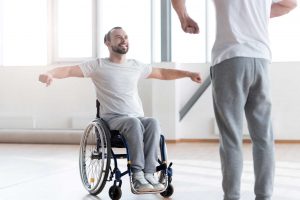Physiotherapy for motor neuron disease
Motor neuron disease (MND) is an uncommon condition that affects cells in the nervous system (neurons) involved in controlling body movement. It leads to muscle weakness that gets worse with time, eventually causing paralysis.
MND can significantly affect an individual’s physical function, independence, and ability to participate in everyday activities. For people with motor neuron disease, physiotherapy aims to preserve functional capacity and independence for as long as possible.
Physiotherapy for motor neuron disease can also involve managing pain, training support people, and prescribing assistive devices to help the individual achieve their goals.
What is motor neuron disease?
Motor neuron disease (MND) is the term for a group of diseases that affect motor (movement) nerves in the brain and spinal cord. It is sometimes also known as Lou Gehrig’s disease. It is a type of degenerative neurological disorder, which means it starts slowly and gradually gets worse.
As the motor neurons stop working as they should, movement messages don’t get through to the muscles properly. As a result, the affected muscles become weak and waste away. This can cause difficulties with speech, swallowing, movement, and breathing. Symptoms are often first noticed on one side of the body and then spread to the other side. Early on, MND symptoms can look like those of other conditions, such as multiple sclerosis (MS).
People with motor neuron disease often experience:
- weakness in the legs – causing difficulties with walking, transfers and balance
- weakness in the arms and hands – causing difficulties with lifting, gripping and holding objects
- joint stiffness – which can lead to difficulties related to loss of motion
- cramps, muscle spasms and twitching
- weakness of muscles in the face and tongue – which can cause difficulties with communication, speech and swallowing
- breathing difficulties and weak cough
- changes to behaviour and thinking.
MND affects each person differently. The symptoms can vary from one person to another, and the condition can progress at different rates.
hidden
hidden
What causes motor neuron disease?
The cause of MND isn’t fully understood. In 90-95% of cases the cause is unknown, while a mutated gene inherited from a parent is responsible for 5-10% of casesi. Inherited MND is known as ‘familial MND’.
In non-inherited MND, the cause may be related to environmental, toxic, viral, or other genetic factorsii.
Currently there is no cure for MND, although researchers are continuing to study the disease and look for one.
Motor neuron disease physiotherapy management: an overview
As a progressive condition, motor neuron disease can’t be stopped or reversed. However, allied health therapeutic supports, including physiotherapy, can help someone with MND to maintain their function, independence and quality of life.
Motor neuron disease physiotherapy will typically involve interventions designed to maintain:
- mobility – including walking ability (with or without an aid) and wheelchair mobility
- transfers – such as moving in bed and getting on/off chairs or the toilet
- functional capacity – such as the ability to complete household tasks
- clear airways – using breathing and coughing techniques
- joint range of motion – to help prevent stiffness, pain and loss of function
- posture – to maintain comfort and joint health
- safety and balance – to reduce falls risk
- quality of life – by assisting with pain management and prescribing assistive technologies, for example.


Motor neuron disease physiotherapy exercises might include breathing training.
Physiotherapy and motor neuron disease: What the evidence shows
MND is uncommon, so there is not as much research into physiotherapy for motor neuron disease as there is for some other conditions, such as dementia and Parkinson’s disease.
However, the National Institute for Health and Care Excellence (NICE) have created guidelines for assessing and managing people with motor neuron diseaseiii. These guidelines aim to improve care for people with MND from the point of diagnosis onwards.
The NICE guidelines note that a multidisciplinary team should be involved in assessing, managing and reviewing people with MND, and that this team should include a physiotherapist.
Aspects of the guidelines a physio may be involved in include:
- managing muscle issues, such as cramping, weakness, and stiffness
- physical function, including mobility and daily living activities
- breathing function and cough effectiveness
- pain management
- end of life care needs
- providing information and support for the person and their family members and/or carers.
For management of MND symptoms, the guidelines recommend typical physiotherapy strategies including:
- exercise programs
- equipment and adaptations to assist with mobility and activities of daily living
- techniques to improve breathing function and cough effectiveness.
MND physiotherapy treatment
Physiotherapists work with each individual and their support people to develop a personalised management plan. As experts in movement and function, physiotherapists design evidence-based, meaningful programs tailored to each person’s needs.
Motor neuron disease physiotherapy might include:
Mobility training
Your physiotherapist will review your mobility at home and, where relevant, out in the community. Depending on what they find, you might be prescribed a program to maintain:
- the quality or safety of your walking
- your ability to get around within your home
- your ability to access your community.
Where needed, your physio may be involved in prescribing assistive devices (such as a walker or wheelchair) to support your ability to participate in everyday life.
Strength training
You might be prescribed exercises to improve strength in muscles not affected by MND, and maintain the strength in affected muscles for as long as possible. Strength training will focus on maintaining your functional capacity, such as your ability to get up from a chair or open jars.
Range of motion exercises
These are exercises to help keep your joints moving freely and prevent stiffness. Maintaining joint range of motion can help maintain your ability to do things like walk, stand straight and reach objects in high cupboards. You might do these exercises independently or with help from your physio or support person.
Falls prevention
Falls are common in people with MND. Your physiotherapist may provide advice on falls prevention, along with training to improve your balance and safety.
Breathing techniques
Physiotherapists use special breathing exercises and airway clearance strategies to help keep your chest clear and maintain lung capacity.
Soft tissue techniques
These can help to loosen tight tissues, assist with maintaining flexibility, and help with pain management.
Advice on posture and positioning
As MND progresses, your physio can provide advice on ways to maintain good posture and avoid muscle shortening (contractures).
Fatigue management
Your physio may talk to you about ways to do things differently to help save your energy and reduce fatigue.
Assistive technologies
Physios may be involved in prescribing devices that support your independence and function, such as electric recliner chairs, hoists, walking aids and wheelchairs.
Training support people
Families and carers often play a significant part in supporting people with motor neuron disease, especially as the condition progresses. Well trained support people can help someone living with motor neuron disease to remain more independent and achieve their goals.
Your physiotherapist might train you to support your loved one with:
- mobilising safely at home and out in the community
- completing their exercise program
- posture and positioning
- using assistive devices
- managing pain.
Motor neuron disease physiotherapy management
The NDIS registered physiotherapists at Active Ability have significant experience working with individuals with MND and their support people. Our caring team take the time to understand your needs and circumstances. We work closely with you to discover your goals and create a treatment plan to help you reach them.
It’s well recognised that effective motor neuron disease management requires input from a multidisciplinary team of health professionals. As well as NDIS physio, we also have NDIS registered clinical dietitians and accredited exercise physiologists at Active Ability.
Every member of our team focuses on helping people with disability to achieve the best possible health, function and quality of life.
With no waiting list or travel charges, you can start treatment as soon as you’re ready and make the best use of your NDIS funding.
To learn more about how we might be able to help you, contact our friendly team on (02) 8678 7874, hello@activeability.com.au or via our contact form.
REFERENCES:
[i] – MND Australia (2021). What is motor neurone disease? https://www.mndaustralia.org.au/mnd-connect/what-is-mnd/what-is-motor-neurone-disease-mnd. Accessed online 16.11.2022.
[ii] – Physiopedia (n.d.) Motor Neurone Disease MND. https://www.physio-pedia.com/Motor_Neurone_Disease_MND. Accessed online 16.11.2022.
[iii] – National Institute for Health and Care Excellence (updated 2019), Motor neurone disease: assessment and management https://www.nice.org.uk/guidance/ng42. Accessed online 16.11.2022.
